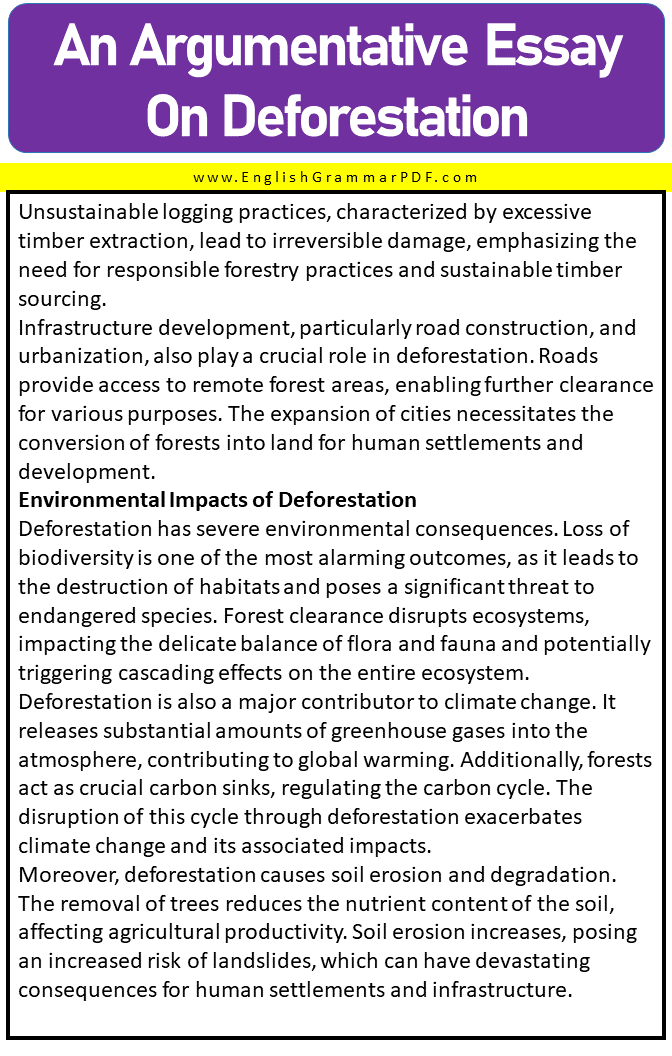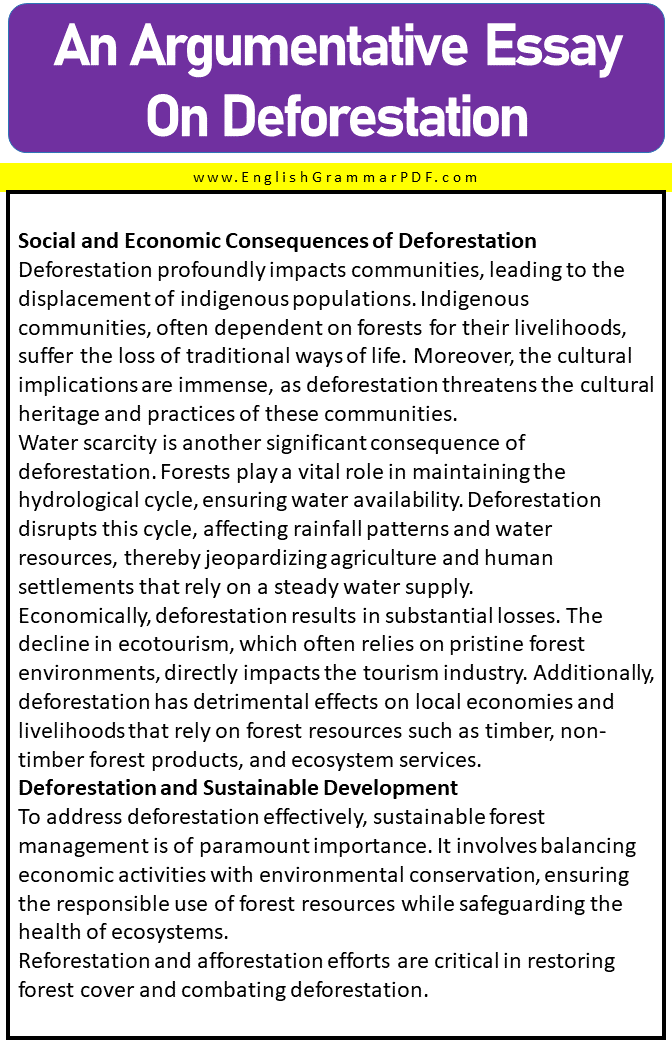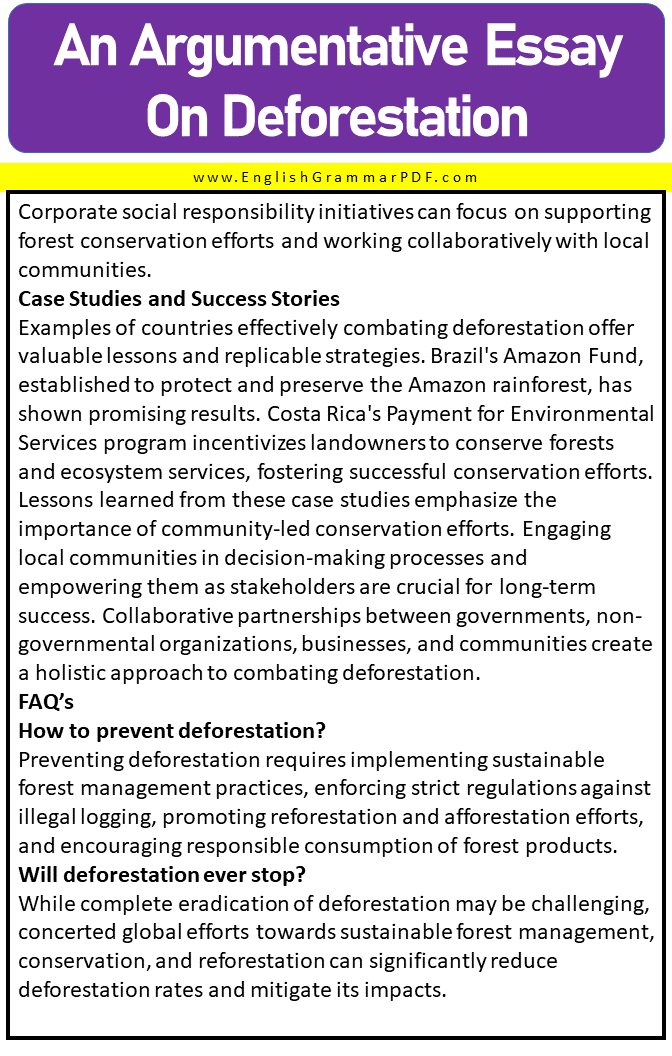An Argumentative Essay On Deforestation
Outline of Essay:
- Introduction
- Causes of Deforestation
- Environmental Impacts of Deforestation
- Social and Economic Consequences of Deforestation
- Deforestation and Sustainable Development
- Solutions to Combat Deforestation
- Case Studies and Success Stories
Introduction
Deforestation, the clearing or removal of forests, is a pressing global issue with far-reaching consequences. The significance of forests for the planet’s health, biodiversity, and climate regulation cannot be overstated. This essay provides an overview of deforestation, its causes, environmental impacts, and social and economic consequences, and offers potential solutions to combat this crisis.
Causes of Deforestation
One major cause of deforestation is agricultural expansion, driven by both commercial farming and subsistence farming. Commercial farming practices necessitate large-scale land clearance, often for cash crops, contributing to extensive deforestation. Subsistence farming, practiced by impoverished communities, involves clearing forests for survival, highlighting the complex challenges faced by these communities.
Logging and timber extraction also contribute significantly to deforestation. Illegal logging, fueled by corruption and weak law enforcement, wreaks havoc on forests and ecosystems. Unsustainable logging practices, characterized by excessive timber extraction, lead to irreversible damage, emphasizing the need for responsible forestry practices and sustainable timber sourcing.
Infrastructure development, particularly road construction, and urbanization, also play a crucial role in deforestation. Roads provide access to remote forest areas, enabling further clearance for various purposes. The expansion of cities necessitates the conversion of forests into land for human settlements and development.
Environmental Impacts of Deforestation
Deforestation has severe environmental consequences. Loss of biodiversity is one of the most alarming outcomes, as it leads to the destruction of habitats and poses a significant threat to endangered species. Forest clearance disrupts ecosystems, impacting the delicate balance of flora and fauna and potentially triggering cascading effects on the entire ecosystem.
Deforestation is also a major contributor to climate change. It releases substantial amounts of greenhouse gases into the atmosphere, contributing to global warming. Additionally, forests act as crucial carbon sinks, regulating the carbon cycle. The disruption of this cycle through deforestation exacerbates climate change and its associated impacts.
Moreover, deforestation causes soil erosion and degradation. The removal of trees reduces the nutrient content of the soil, affecting agricultural productivity. Soil erosion increases, posing an increased risk of landslides, which can have devastating consequences for human settlements and infrastructure.
Social and Economic Consequences of Deforestation
Deforestation profoundly impacts communities, leading to the displacement of indigenous populations. Indigenous communities, often dependent on forests for their livelihoods, suffer the loss of traditional ways of life. Moreover, the cultural implications are immense, as deforestation threatens the cultural heritage and practices of these communities.
Water scarcity is another significant consequence of deforestation. Forests play a vital role in maintaining the hydrological cycle, ensuring water availability. Deforestation disrupts this cycle, affecting rainfall patterns and water resources, thereby jeopardizing agriculture and human settlements that rely on a steady water supply.
Economically, deforestation results in substantial losses. The decline in ecotourism, which often relies on pristine forest environments, directly impacts the tourism industry. Additionally, deforestation has detrimental effects on local economies and livelihoods that rely on forest resources such as timber, non-timber forest products, and ecosystem services.
Deforestation and Sustainable Development
To address deforestation effectively, sustainable forest management is of paramount importance. It involves balancing economic activities with environmental conservation, ensuring the responsible use of forest resources while safeguarding the health of ecosystems.
Reforestation and afforestation efforts are critical in restoring forest cover and combating deforestation. These initiatives involve planting trees in deforested areas and promoting the growth of new forests. They contribute to ecosystem restoration, biodiversity conservation, and climate regulation.
International agreements and initiatives play a crucial role in addressing deforestation. REDD+ (Reducing Emissions from Deforestation and Forest Degradation) is a mechanism aimed at providing incentives for developing countries to reduce deforestation and promote sustainable land management. The Paris Agreement recognizes the importance of forests in combating climate change and emphasizes their protection and restoration.
Solutions to Combat Deforestation
Effective solutions to combat deforestation require robust government policies and regulations. Forest conservation laws should be implemented and enforced, ensuring the protection of forests and ecosystems. Land-use planning and zoning are essential to regulate and guide development, preventing encroachment into forested areas.
Public awareness and education are vital in promoting sustainable consumption patterns. Encouraging responsible forest practices, such as using certified sustainable products, helps create demand for environmentally friendly alternatives. Moreover, individuals can actively participate in reforestation and afforestation efforts, contributing to the restoration of forests.
Corporate responsibility is another key aspect. Certification and sustainable sourcing ensure that businesses prioritize environmentally sound practices. Corporate social responsibility initiatives can focus on supporting forest conservation efforts and working collaboratively with local communities.
Case Studies and Success Stories
Examples of countries effectively combating deforestation offer valuable lessons and replicable strategies. Brazil’s Amazon Fund, established to protect and preserve the Amazon rainforest, has shown promising results. Costa Rica’s Payment for Environmental Services program incentivizes landowners to conserve forests and ecosystem services, fostering successful conservation efforts.
Lessons learned from these case studies emphasize the importance of community-led conservation efforts. Engaging local communities in decision-making processes and empowering them as stakeholders are crucial for long-term success. Collaborative partnerships between governments, non-governmental organizations, businesses, and communities create a holistic approach to combating deforestation.
FAQ’s
How to prevent deforestation?
Preventing deforestation requires implementing sustainable forest management practices, enforcing strict regulations against illegal logging, promoting reforestation and afforestation efforts, and encouraging responsible consumption of forest products.
Will deforestation ever stop?
While complete eradication of deforestation may be challenging, concerted global efforts towards sustainable forest management, conservation, and reforestation can significantly reduce deforestation rates and mitigate its impacts.
Download the PDF of the Essay:





Explore More Essays:


